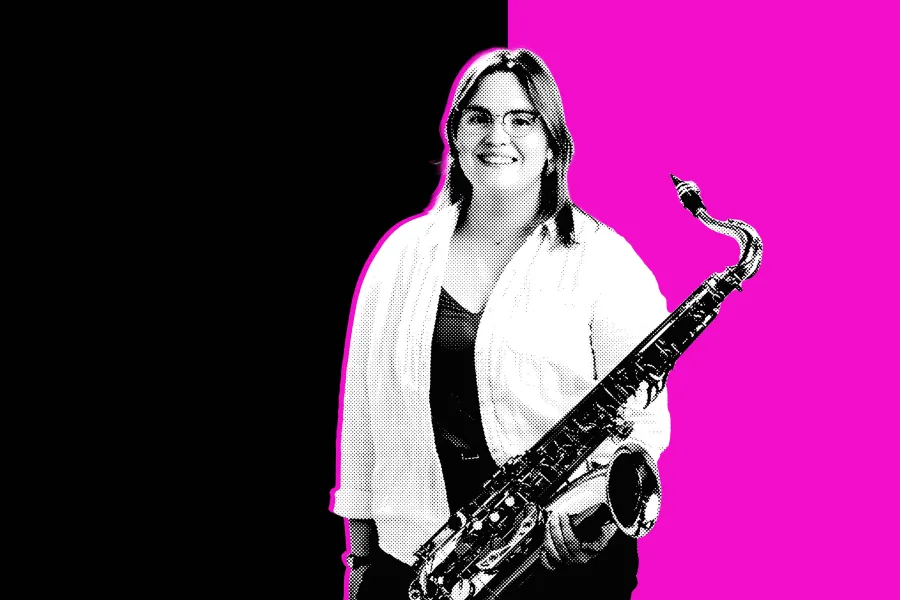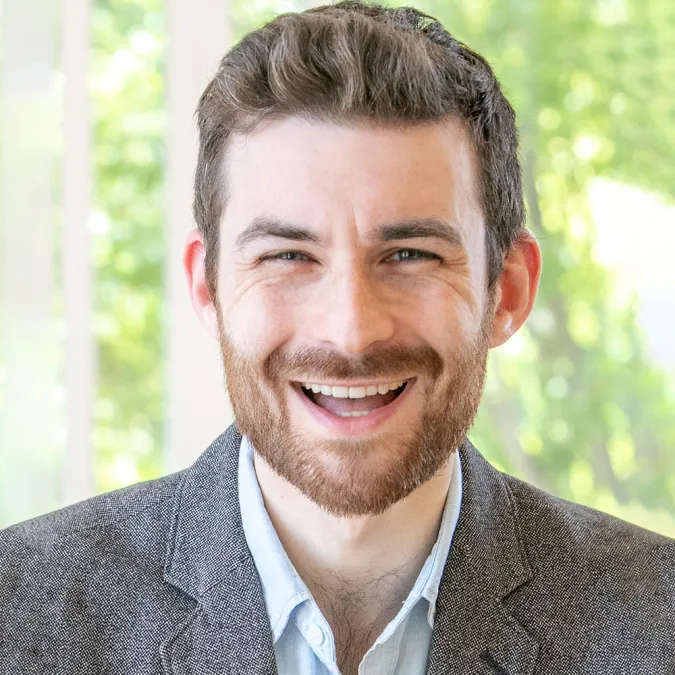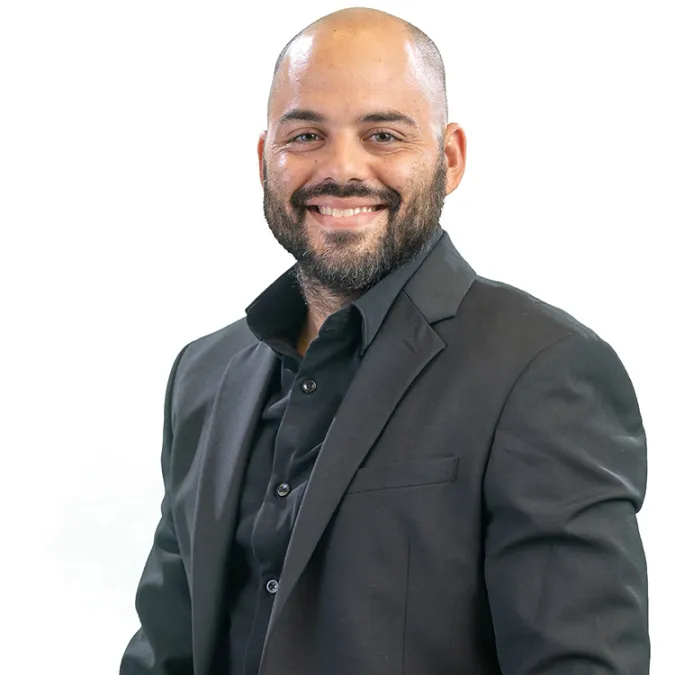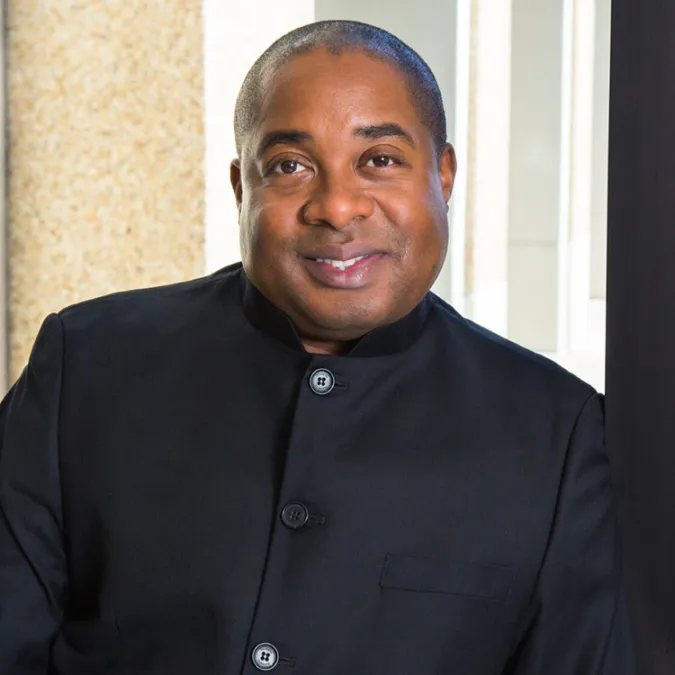
Cliff Croomes, conductor
Tyler Ehrlich, guest conductor
Jimmy Santos-Rivera, guest conductor
Sameer Kotasthane, tabla
This concert will last about 75 minutes without intermission.
Please silence your electronic devices.
Photography, video, or recording of any part of this performance is prohibited
Program
Anthony Dilorenzo
Luminosity brass ensemble
Jimmy Santos-Rivera, conductor
Percy Grainger
ed. Schissel
The Merry King
Morton Gould
Ballad for Band
Reena Esmail
Chamak
Ember (Bhajani)
Luster (Vilambit Teentaal)
Spark (Rupak and Dandra)
Sameer Kotasthane, tabla
Tyler Ehrlich, conductor
Edvard Grieg
arr. Jones
Peer Gynt Suite No. 1, Op.46 woodwind choir
Morning Mood
Death of Ase
Anitra’s Dance
In the Hall of the Mountain King
Wataru Hokoyama
Beyond
About the Program
Program notes by Mark Bilyeu except where noted.
Anthony DiLorenzo
Luminosity
Born August 8, 1967, Stoughton, Mass
Composed 2013
Duration 6 minutes
Anthony DiLorenzo has a multi-faceted career as trumpeter, arranger, and composer of everything from original concert music which has been performed by the San Francisco Symphony, the New World Symphony, the Tokyo Symphony and the Boston Pops Orchestra, to movie trailers including Toy Story, Harry Potter, and Forrest Gump, to broadcast television themes for ABC’s College Football, Figure Skating and Horse Racing shows. Luminosity was commissioned for The Messiah College Brass Choir for the grand opening of The Calvin and Janet High Center for Worship and the Performing Arts. “The music is meant to be vibrant and energetic as it mimics a distant Pulsar emitting bursts of light and energy. The star can illuminate the most wondrous display of beauty and color showing off its magnificent power and nobility."
Percy Grainger
The Merry King
Born July 8, 1882, City of Brighton, Australia
Died February 20, 1961, White Plains, NY
Composed 1905
Duration 5 minutes
Although the name of Australian composer and pianist Percy Grainger is irrevocably linked to wind band literature, his influence reaches far past his large oeuvre which includes “Lincolnshire Posey,” “Irish Tune from County Derry,” and everyone’s favorite reel: “Molly on the Shore.” One of these contributions was his idea of “Elastic Scoring,” which he publicly introduced in his 1929 essay "To Conductors, and those forming, or in charge of, Amateur Orchestras, High School, College and Music School Orchestras and Chamber-Music Bodies." In it, he argued for the creation of musical scores which did not rely on a certain number of personnel to be available to have a successful performance of a work. In his essay, he writes "As long as a really satisfactory balance of tone is preserved (so that the voices that make up the musical texture are clearly heard, one against the other, in the intended proportions) I do not care whether one of my 'elastically scored' pieces is played by 4 or 40 or 400 players, or any number in between;...I do not even care whether the players are skilful[sic], or unskilful[sic],, as long as they play well enough to sound the right intervals and keep the afore-said tonal balance--and as long as they play badly enough to still enjoy playing ('Where no pleasure is, there is no profit taken'--Shakespeare).” The Merry King is one such work of his. First published as a piano solo in an anthology entitled “British Folk-Music Settings,” he adapted it and others as an “English Folksong set for piano and 9 (or 10 or 11) single wind instruments.”
Morton Gould
Ballad for Band
Born December 10, 1913, Richmond Hill, New York
Died February 21, 1996, Orlando, Florida
Composed 1946 Premiere June 12, 1946 by Goldman Band of New York
Duration 8 minutes
Morton Gould was an American composer, conductor, arranger, and pianist. In 1995, he won the Pulitzer Prize for his Stringmusic, and in 2005 he was honored posthumously with a Grammy Lifetime Achievement Award. Gould wrote “Ballad for Band is basically an introverted piece that starts slowly, is linear, and has a quiet lyricism; it is not big band in the sense that there is little razzle-dazzle. A discerning listener who is programmed to appreciate the nuances and subtlety of a contemporary piece would respond favorably to this, but others merely find it from relatively pleasant to slightly boring. Only certain listeners respond to what this piece represents musically.” Although the melodies are original, Gould based them on his impressions of African-American spirituals. He explained, “I have always been sensitive to and stimulated by the sounds that I would call our ‘American vernacular’—jazz, ragtime, gospel, spirituals, hillbilly. The spirituals have always been the essence, in many ways, of our musical art, our musical spirit. The spiritual is an emotional, rhythmic expression. The spiritual has a universal feeling; it comes from the soul, from the gut. People all over the world react to them… I am not aware of the first time I heard them. It was undoubtedly a sound I heard as a child; maybe at a revival.”
— Penny Brandt
Reena Esmail
Chamak
Born Born February 11, 1983
Composed 2023
Premiered March 15, 2023, Waubonsie Valley High School Wind Ensemble, Mark Duker, conductor, Gurpreet Birk, tabla player, Wentz Concert Hall, Naperville, IL.
Duration 10 minutes
Indian-American composer Reena Esmail works between the worlds of Indian and Western classical music, and brings communities together through the creation of equitable musical spaces. With degrees from The Juilliard School and the Yale School of Music, Esmail is the Los Angeles Master Chorale’s 2020-2025 Swan Family Artist in Residence, and was Seattle Symphony’s 2020-21 Composer-in-Residence. “The word chamak means ‘spark’ in Hindi,” Esmail explains, “and the title of this work was inspired by a beautiful couplet from the Indian saint-poet Kabir:
जैसे तिल में तेल है
ज्यों चमक में आग
तेरा साईँ तुझ में है
तू जाग सके तो जाग
which translates to:
Just as a seed holds oil
And a spark holds fire
Your own spirit is inside of you
If you can awaken it, you must.
Each of the three movements of this piece explores a different translation of the word ‘chamak’: the first is “Ember,” which is a dark, smoky, lilting melody in Raag Bhimpalas. The second, “Luster,” is a warm, intimate journey in Raag Hamsadhwani. And the last movement, “Spark,” is a fiery, vibrant jaunt in Raag Jog. I hope this piece ignites a spark in two ways. As young creative people, just beginning to find their way in the world, I hope this piece is a reminder to follow that spark that lies within each of them. And more broadly, I hope that this piece sparks an interest in Indian classical music in the band world — these musical cultures have been separate for so many years, and I hope this piece sparks further connection between these two worlds.”
Edvard Grieg
Peer Gynt Suite No. 1, Op. 46
Born June 15, 1843, Bergen, Norway
Died September 4, 1907, Bergen Norway
Composed 1875
Premiered February, 1876, Oslo, Sweden
Duration 15 minutes
Edvard Grieg composed incidental music to Henrik Ibsen’s 1867 play “Peer Gynt” in 1875, less than ten years after Ibsen finished his play, yet they premiered together in February of 1876. Ibsen’s play, written in Bokmål Norwegian—a close ancestor of Danish—tells the Norwegian fairy tale of a charming but rather lazy peasant who leaves home to seek out a fortune. His journey is filled with (mis)adventures as he makes his way to the African desert and back again to his homeland. Ten years after the works’ premieres, Grieg extracted eight movements and crafted two stand-alone suites. Suite No. 1, Op. 46 includes the iconic “Morning Mood” and “In the Hall of the Mountain King,” (both melodies which might bring about images of Bugs Bunny) alongside the evocative “Anitra’s Dance,” and the tragic “Death of Åse,” Peer’s mother. As a composer who devoted his life to developing a Norwegian national identity as Sibelius had done in Finland, and Mussorgsky in Russia, the work became an important part of Grieg’s output. Hiis wife Nina wrote in a letter, “ The more he saturated his mind with the powerful poem [Peer Gynt], the more clearly he saw that he was the right man for a work of such witchery and so permeated with the Norwegian spirit.”
Wataru Hokoyama
Beyond
Born August 24, 1974, Aizu, Japan
Composed 2001
Premiered 2001
Duration 8 minutes
Multi-award-winning film & game composer, Wataru Hokoyama has worked on such Hollywood blockbuster films as Thor: Ragnarok, Croods: A New Age, Lego Movie 2 and Hotel Transylvania 3. Hokoyama is an alumnus of Interlochen Arts Academy, and holds a bachelor of fine arts degree from the Cleveland Institute of Music, and an advanced certificate from the University of Southern California (scoring for motion pictures and television program). Beyond was originally commissioned by the Japan Air Self-Defense Western Air Band and premiered in 2001. Hokoyama writes, "Since this piece was commissioned by an air force band, I wanted to express the scenery and the images of 'heroes in the sky,' and I tried to make it dramatic and cinematic."
About the Artists
Tyler Ehrlich

Tyler Ehrlich (he/him) serves as an assistant instructor and doctoral candidate in wind conducting at The University of Texas at Austin. In this role, he assists with conducting and administrating the university’s concert bands, athletic bands, new music ensemble, and conducting and wind literature courses. Tyler also curates and hosts 89.5 KMFA’s From the Butler School, a weekly program that brings student and faculty performances to the station’s 100,000 weekly listeners. Tyler previously lived in Atlanta, Georgia where he served as conductor of the Emory University Wind Ensemble, director of bands at Decatur High School, and associate conductor of the Atlanta Wind Symphony. He has given invited talks on topics including exoticism, pedagogy, and interpretation at the Midwest Band and Orchestra Clinic, the World Association of Symphonic Bands and Ensembles International Conference, the College Band Directors National Association National Conference, and the Texas and Georgia Music Educators Conferences. Ehrlich has a Master of Music degree from the University of Georgia and a Bachelor of Arts degree summa cum laude from Cornell University. He lives with his partner Brent and their dog Milo. Tyler’s website is tylerehrlich.com.
Jimmy Santos-Rivera

Jimmy Santos-Rivera (he/him) is currently pursuing a master of music in wind conducting at The University of Texas at Austin, where he serves as a graduate teaching assistant. In this role, he assists in conducting and managing the university’s concert bands, athletic bands, and conducting courses. He earned his bachelor of arts in music education, with a minor in percussion, from the University of Puerto Rico, Río Piedras. Born and raised in Puerto Rico, his career has been deeply rooted on the island. Prior to moving to Austin, Santos-Rivera spent eight years teaching concert band, percussion, and music theory at Escuela Especializada en Bellas Artes Pablo Casals. As a performer, he has played in the percussion section of the Puerto Rico Symphony Orchestra, the Puerto Rico Wind Symphony, and the Puerto Rico Philharmonic Orchestra. In 2019, he joined the 248th Army Band in San Juan, Puerto Rico, where he currently serves as a percussionist in various ensembles and as the principal conductor of the concert band. His mentors include Carlos Ávila, Eddy Marcano, Karlo Flores, and Carmen Acevedo.
Cliff Croomes

Cliff Croomes serves as the Associate Director of Bands and Director of the Longhorn Band at the University of Texas at Austin. Prior to this appointment, Croomes was the Assistant Director of Bands at Louisiana State University and the Music Director and Principal Conductor of the Civic Orchestra of Baton Rouge. Previous to his appointment the faculty he studied at LSU for his Master of Music and Doctor of Musical Arts degrees. Dr. Croomes earned his Bachelor of Music Studies degree from the University of Texas at Austin and is an alumnus of the Cavaliers Drum and Bugle Corps from Rosemont, Illinois. He has performed with ensembles throughout the United States, London, Paris, Switzerland, Germany, Italy and consulted throughout Japan. Dr. Croomes holds an endorsement with Innovative Percussion Inc. and is a founding board member of the composer diversity initiative “And We Were Heard” as well as a member of the Dr. William P. Foster Project advisory board. Dr. Croomes also holds an honorary membership in Kappa Kappa Psi.
Symphony Band
Flute
Josey April
Gerardo Ayala
Micah Bronaugh
Juan Fajardo
Zachary Gray
Charlotte Karner
Rabeeba Mahaseen
Natalie Porter
Sophie Sheara
Oboe
Emma Ball
Spencer Dwyer
Zane Laijas
Reagan Tompkins
Tara Tran-Huu
Kevin Xiong
Clarinet
Georgia Casillo
Natalie Eddings
Michael Golston
Daniel Ortiz
Darien Salter
Brian Song
Jesus Trejo
William Zheng
Bassoon
Raymundo Benavides
Gabriella Jensen
Naomi Kitamura
Lauren Kansy
Gavin Malden
Carson McCay
Sabrina Pector
Judith Salas
Darren Tea
Saxophone
Phoenix Alcera
Austin Davidson
Luc Billete
Ben Crowley
Nigel Duplessis
Sasha Sanchez
Daniel Kim
Chantal Lee
Pablo Ramón
Joseph Lowry
Brandon Shen
Horn
Timothy McCormick
Bianca Miller
Luke Onorato
Elizabeth Whitehead
Trumpet
Jaime Hernandez
Dash Kostka
Matthew Nichols
Christopher Ray
Trombone
Jan Campos
Joshua Gault
Jackson Hawk
Michael Newell
Euphonium
Casey Hawthorne
Eric Ingram
Tuba
Samantha Yanez
Percussion
Victoria Garcia
Khaden Joyner
Federico Lopez
Diego Palacios
Alina Robledo
Joel Rodriguez
Harp
Alyssa Vought
Double Bass
Reilly Curren
Keyboard
Shao Chu Pan
Event Details
Free admission

